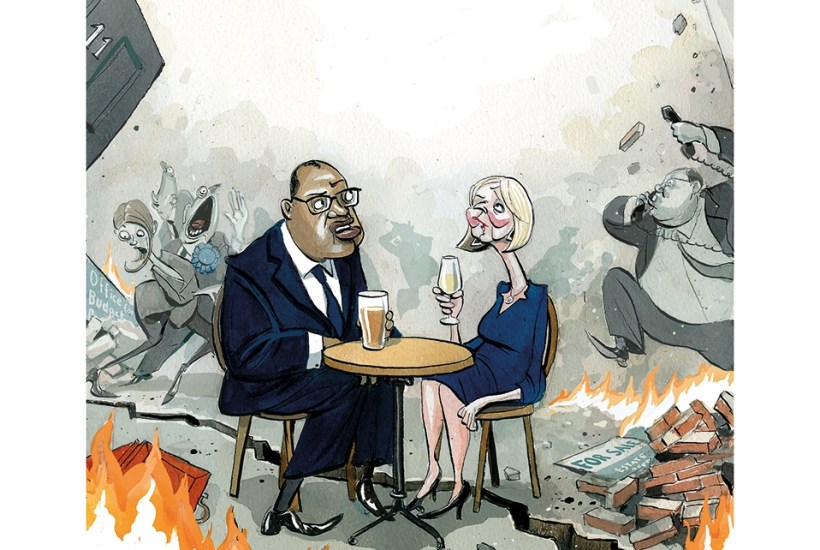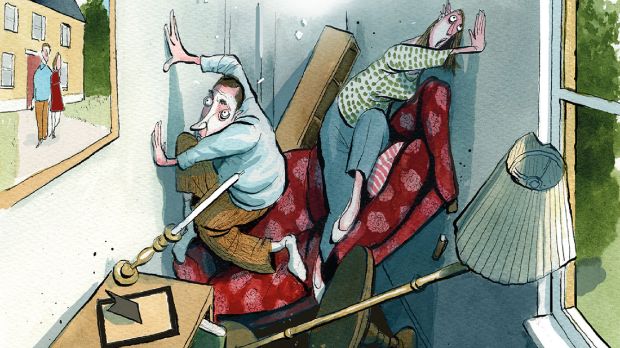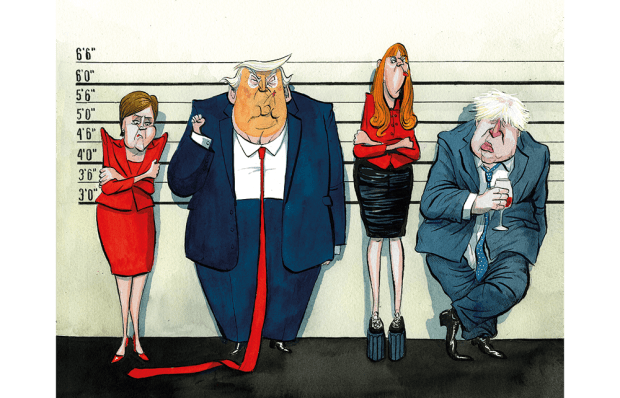What’s the sign of a successful Budget? Chris Philp, the new chief secretary to the Treasury, gave his answer moments after Chancellor Kwasi Kwarteng’s statement last Friday: a strong pound.
‘Great to see sterling strengthening on the back of the new UK growth plan,’ he tweeted out. A (temporary) rising pound made sense to Truss supporters, who argued that markets would support their transition to a lower-tax, higher-growth economy. This was, they thought, their vindicating moment.
The moment didn’t last. Within minutes, the pound had entered a steep descent and UK borrowing costs surged. But Kwarteng is not a politician who panics. Instead of staying in the office and trying to understand what had happened, he went to celebrate with Treasury staffers in the local pub, a traditional way to mark the freeze in alcohol duty. Let’s see where markets are in four weeks’ time, he told friends: half a day’s worth of data is a blip, not a trend. Over the weekend he doubled down, promising more tax cuts to come. In response, the market doubled down too.
By Monday, the pound hit $1.03, an all-time low, and pressure was growing on the Bank of England to announce an emergency interest-rate hike. Hundreds of mortgage deals started getting pulled from the market in anticipation – sparking fears of a property price crash. The ‘blip’ started to look serious. The Treasury finally moved to calm the markets, promising updates on its ‘medium-term fiscal plan’ next month. Even this was going further than the Prime Minister wanted, but she was ultimately convinced by Kwarteng – who now plans to calm the market with several weeks of silence.
But the Bank was not prepared to wait. Having said last week that it would push forward with its plans to sell government debt, it performed an emergency U-turn on Wednesday morning, announcing it would start buying government debt again on ‘whatever scale is necessary’ once evidence emerged that spikes in borrowing costs were putting traditional pension funds at risk. It’s the kind of intervention you see when crisis hits.
All this marks a new economic era – or, rather, the return of an old one. James Carville, Bill Clinton’s economic adviser, might be best-known for succinctly stating the obvious: ‘It’s the economy, stupid.’ But he also had a knack for summing up tricky technical points: ‘I used to think if there was reincarnation, I wanted to come back as the president or the pope,’ he said in 1994. ‘But now I want to come back as the bond market. You can intimidate everybody.’
This is how things were back then. If governments borrowed too much, the markets charged them a fortune. In this way, markets could bring a government to its knees. It was this logic that drove the Tory austerity era. The then-chancellor George Osborne’s ‘sober decade’ was premised on a deep fear that if he didn’t work towards a balanced Budget, markets would punish the British economy. But during this decade, something strange happened: the markets seemed to lose their bite. Governments borrowed billions but were still charged rock-bottom rates.
Nothing, it seemed, would revive these rates. Despite hawkish warnings that inflation would soar due to all the money that was being printed, the headline rate stayed low, with bank rates nailed to the floor. Even on the occasions in 2013 and 2016 when the UK lost its triple-A credit ratings, the market response was minimal. Some Tories began to wonder if they’d been following a dead dogma, that the old economic rules no longer applied. Perhaps you really could do what you want, borrow what you like, with impunity. Boris Johnson was more than happy to test this spending-go-lucky theory.
The Covid crisis saw this premise tested to the extreme. More money was printed in 2020 than in the entirety of the previous decade, helping the UK to borrow record billions at record-low rates. Even politicians like Liz Truss – who was once wedded to the idea of fiscal responsibility – started to think differently. If you can borrow for spending splurges, why not for tax cuts? She decided to test her borrowing plan in the very week that markets made it clear, in Britain and worldwide, that the old rules did still apply.
Across the world, interest rates are hitting multi-year highs, as central banks have grudgingly accepted they need to bring down inflation. The US Federal Reserve has been moving faster than others to raise rates, so sterling, the yuan and the euro have taken a pummelling against the dollar. Bond yields (the interest rate that governments borrow at) have been rising for weeks across the West and are now at ten-year highs in Germany and France. But since last week’s mini-Budget, UK gilt yields have run away, experiencing a bigger rise than almost any other country. In these times, it doesn’t pay to be the outlier.
Why didn’t Truss and Kwarteng take these market shifts into account? It’s a question puzzling MPs as much as it is economists and traders. ‘Higher borrowing costs were a Europe-wide problem,’ notes one frustrated Tory MP. ‘But now we’ve put all the attention on ourselves, and we don’t look good.’ Another minister says: ‘If this goes wrong, we risk toxifying the whole tax-cutting agenda by doing it in a really stupid way.’
It’s not obvious that markets would have received this mini-Budget particularly well at any time over the past decade. Even when prime ministers have looked to borrow more, their chancellors have always been careful to pay lip service to fiscal responsibility and to make sure medium-term forecasts showed the debt-to-GDP ratio remained steady. Gordon Brown, at his most profligate, would at least purport to have a plan to get borrowing back under control.
‘But there were no forecasts last week,’ laments one minister. ‘Everyone feels tricked.’ People knew that Truss would cut taxes, but her ‘fiscal statement’ had been sold as an emergency intervention for energy bills. That was the rationale for suspending the usual Office for Budget Responsibility report. Then the statement morphed into a mega-Budget with massive tax announcements that won’t come into effect until April next year. ‘Cutting out the OBR now feels deliberate,’ the same minister says.
Nor was there even so much as a nod towards spending restraint – No. 10 insisted upon that, and the Treasury is now thought to regret the fact. Without OBR forecasts, independent groups and banks are doing their own calculations: Deutsche Bank estimates that in the six months remaining in this fiscal year, borrowing will need to be revised upwards by £85 billion. As James Forsyth reports, there is already evidence of a split between No. 10 and the Treasury over what to do next, with the Treasury more adamant that some kind of spending cut needs to be announced.
There’s speculation that this will manifest as a freeze on departmental budget increases, which – with inflation at almost 10 per cent – would translate into substantial real-term cuts. This would indicate to the market that the government was serious about balancing its budget. But when crunch time comes, is the government really prepared to implement real-term cuts in healthcare, education, criminal justice or defence? ‘Boris was a liar,’ another Tory MP says. ‘Liz is not. She delivers on what she says. But have you noticed she doesn’t talk about spending cuts any more?’
That has always been the missing element of Trussonomics: how her Treasury might account for its tax cuts in the public finances. Last week’s rejection of fiscal discipline suggests that she and Kwarteng thought the markets would allow them time to respond to this question. Instead, answers are needed now.
All eyes are now on Kwarteng’s update in November. That the government raised £1.2 billion in this week’s gilt auction has calmed factions of the Tory party, who were relieved to see there’s still plenty of appetite to buy UK debt. The Truss plan may end up a lot more expensive than was anticipated, they’re thinking, but it might still work. It’s no exaggeration to say that the Conservative party’s future depends on it.
Got something to add? Join the discussion and comment below.
Get 10 issues for just $10
Subscribe to The Spectator Australia today for the next 10 magazine issues, plus full online access, for just $10.
You might disagree with half of it, but you’ll enjoy reading all of it. Try your first month for free, then just $2 a week for the remainder of your first year.















Comments
Don't miss out
Join the conversation with other Spectator Australia readers. Subscribe to leave a comment.
SUBSCRIBEAlready a subscriber? Log in